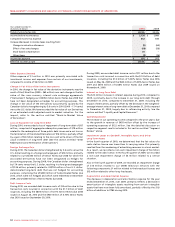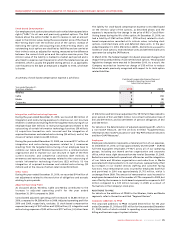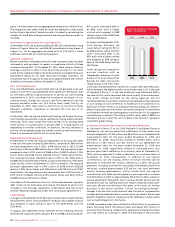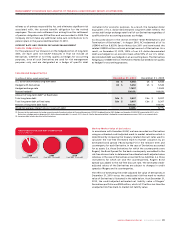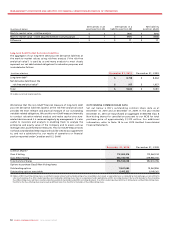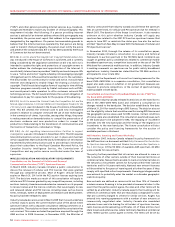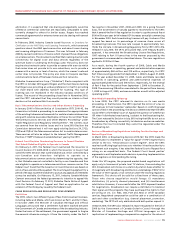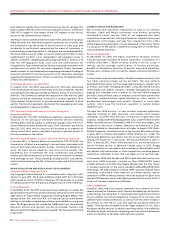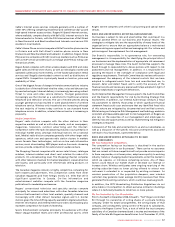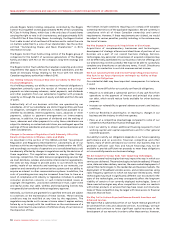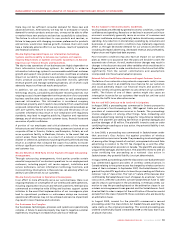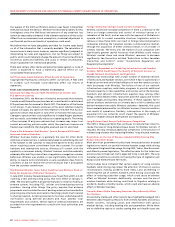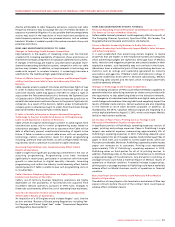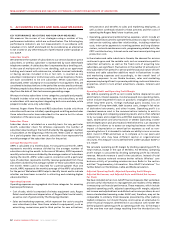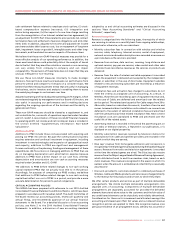Rogers 2010 Annual Report Download - page 49
Download and view the complete annual report
Please find page 49 of the 2010 Rogers annual report below. You can navigate through the pages in the report by either clicking on the pages listed below, or by using the keyword search tool below to find specific information within the annual report.
ROGERS COMMUNICATIONS INC. 2010 ANNUAL REPORT 53
MANAGEMENT’S DISCUSSION AND ANALYSIS OF FINANCIAL CONDITION AND RESULTS OF OPERATIONS
The CRTC is also responsible under the Telecommunications Act for the
regulation of telecommunications carriers, which includes the
regulation of Wireless’ mobile voice and data operations and Cable’s
Internet and telephone services. Under the Telecommunications Act,
the CRTC has the power to forbear from regulating certain services or
classes of services provided by individual carriers. If the CRTC finds that
a service or class of services provided by a carrier is subject to a degree
of competition that is sufficient to protect the interests of users, the
CRTC is required to forbear from regulating those services unless such
an order would be likely to unduly impair the establishment or
continuance of a competitive market for those services. All of our Cable
and telecommunications retail services have been deregulated and are
not subject to price regulation. However, regulations can and do affect
the terms and conditions under which we offer these services.
Accordingly, any change in policy, regulations or interpretations could
have a material adverse effect on Cable’s operations and financial
condition and operating results.
Copyright Board of Canada
The Copyright Board of Canada (“Copyright Board”) is a regulatory
body established pursuant to the Copyright Act (Canada) (the
“Copyright Act”) to oversee the collective administration of copyright
royalties in Canada and to establish the royalties payable for the use of
certain copyrighted works. The Copyright Board is responsible for the
review, consideration and approval of copyright tariff royalties payable
to copyright collectives by Canadian broadcasting undertakings,
including cable, radio, television and specialty services.
Industry Canada
The technical aspects of the operation of radio and television stations,
the frequency-related operations of the cable television networks and
the awarding and regulatory supervision of spectrum for cellular,
messaging and other radio-telecommunications systems in Canada are
subject to the licencing requirements and oversight of Industry Canada.
Industry Canada may set technical standards for telecommunications
under the Radiocommunication Act (Canada) (the “Radiocommunication
Act”) and the Telecommunications Act.
Restrictions on Non-Canadian Ownership and Control
Non-Canadians are permitted to own and control directly or indirectly
upto33.3%ofthevotingsharesand33.3%ofthevotesofaholding
company that has a subsidiary operating company licenced under the
BroadcastingAct.Inaddition,upto20%ofthevotingsharesand20%
of the votes of the operating licencee company may be owned and
controlled directly or indirectly by non-Canadians. The chief executive
officer and 80% of the members of the Board of Directors of the
operating licencee must be resident Canadians. There are no restrictions
on the number of non-voting shares that may be held by non-Canadians
at either the holding-company or licencee-company level. Neither the
Canadian carrier nor its parent may be otherwise controlled in fact by
non-Canadians. Subject to appeal to the federal Cabinet, the CRTC has
the jurisdiction to determine as a question of fact whether a given
licencee is controlled by non-Canadians.
Pursuant to the Telecommunications Act and associated regulations,
the same rules apply to Canadian carriers such as Wireless, except that
there is no requirement that the chief executive officer be a resident
Canadian. The same restrictions are contained in the
Radiocommunication Act and associated regulations.
In its March 2010 Budget, the federal government announced its
intention to remove the existing restrictions on foreign ownership of
Canadian satellites (subsequently passed into law in the fall of 2010).
The government also announced that it would review the foreign
ownership restrictions currently applied to telecommunications
companies. In June 2010, Industry Canada released its consultation
paper on this matter asking for comments by July 2010 on
three options:
1. Increasing the limit for direct foreign investment in broadcasting
and telecommunications common carriers to 49 percent;
2. Lifting restrictions on telecommunications common carriers with a
10 percent market share or less, by revenue; or
3. Removing telecommunications restrictions completely.
Rogers filed its comments in July 2010 submitting that of the three
options only option 1 was acceptable because options 2 and 3 fail to
recognize the converged market for communications services in
Canada. The attempt made in Options 2 and 3 to limit the reforms to
“pure telecommunications” networks is out of step with the reality of
broadband markets and inconsistent with the government’s attempt to
implement a digital economy strategy for Canada.
In November 2010, Industry Canada announced that the government’s
deliberations on potential foreign ownership changes would be
coordinated with the spring 2011 consultation on the appropriate
structure of the 700 MHz spectrum auction.
Policy Direction to the CRTC on Telecommunications
In December 2006, the Minister of Industry issued a Policy Direction on
Telecommunications to the CRTC under the Telecommunications Act.
The Direction instructs the CRTC to rely on market forces to the
maximum extent feasible under the Telecommunications Act and
regulate, if needed, in a manner that interferes with market forces to
the minimum extent necessary.
2010 Legislation
Bill C-28, An Act to promote the efficiency and adaptability of the Canadian
economy by regulating certain activities that discourage reliance on electronic
means of carrying out commercial activities, and to amend the Canadian Radio-
television and Telecommunications Commission Act, the Competition Act, the
Personal Information Protection and Electronic Documents Act and the
Telecommunications Act (Anti-Spam Act), passed into law on
December15,2010.
The Bill addresses unsolicited commercial electronic mail (spam) by
prohibiting the sending of commercial electronic messages without
consent. It prohibits detrimental practices to electronic commerce,
protects the integrity of transmission data and prohibits the installation
of computer programs without consent in the course of commercial
activity. In addition, it prohibits false or misleading commercial
representations online and prohibits the collection of personal
information via unlawful access to computer systems and the
unauthorized compiling or supplying of lists of electronic addresses. It
also provides for a private right of action for businesses and consumers
with extended liability. It allows the CRTC and the Competition Tribunal
of Canada to impose administrative monetary penalties on those who
violate the respective Acts and allows for the international sharing of
information and evidence to pursue spammers outside of Canada with
our global partners.
Amendments to the Quebec Consumer Protection Act were passed in
December 2009 to introduce new provisions applicable to sequential
performance contracts provided at a distance, including wireless,
wireline and Internet service contracts. These amendments include new
rules on the content of such contracts, the determination of the early
cancellation fees that can be charged to customers, the use of security
deposits and the cancellation and renewal rights of the consumers. The
amendments also introduce new provisions on the sale of prepaid cards
and the disclosure of the costs of the services and products they
advertise. The Amendments came into force on June 30, 2010.
Proposed Legislation
Bill C-22, An Act respecting the mandatory reporting of Internet child
pornography by persons who provide an Internet service, was introduced in
the House of Commons in May 2010. Bill C-22 is intended to fight
Internet child pornography by requiring Internet service providers



